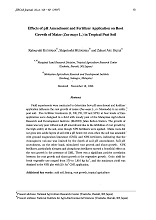Field experiments were conducted to determine how pH amendment and fertilizer·application influence the root growth of maize (Zea mays L., cv. Masmadu) in an acidic peat soil. Five fertilizer treatments (0, NK, PK, NP and NPK) at four levels of lime application were designed in a field with woody peat of the Malaysian Agricultural Research and Development Institute (MARDI) Jalan Kebun Station. The growth of maize was very poor without soil pH amendment due to the inhibition of root growth by the high acidity of the soil, even though NPK fertilizers were applied. Maize roots did not grow into acidic layers of soil with a pH below 3.8, even when the soil was amended with ground magnesium limestone (GML) and NPK fertilizers, indicating that the rhizosphere volume was limited by the depth of soil pH amendment. Soil pH amendment, on the other hand, stimulated root growth and shoot growth. NPK fertilizers, particularly nitrogen and phosphorus fertilizers exerted a beneficial effect on the root growth in the presence of GML. There was a significant positive correlation between the root growth and shoot growth at the vegetative growth. Grain yield for fresh vegetable use ranged from 179 to 1,810 kg ha-1, and the maximum yield was obtained in the NPK plot with 25 t ha-1 GML application.

